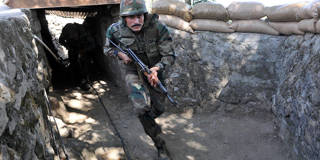Nuclear-armed Pakistan is now at risk of becoming a failed state. But even if it does not fail, the nexus between terrorist groups and the country's powerful military raises the specter of nuclear terrorism – a risk that the US must take action to contain.
BERLIN – Almost seven decades after it was created as the first Islamic republic of the postcolonial era, Pakistan is teetering on the edge of an abyss. The economy is stagnant, unemployment is high, and resources are scarce. The government is unstable, ineffective, and plagued by debt. The military – along with its rogue Inter-Services Intelligence (ISI) agency, comprising the country’s spies and secret policemen – is exempt from civilian oversight, enabling it to maintain and deepen its terrorist ties.

BERLIN – Almost seven decades after it was created as the first Islamic republic of the postcolonial era, Pakistan is teetering on the edge of an abyss. The economy is stagnant, unemployment is high, and resources are scarce. The government is unstable, ineffective, and plagued by debt. The military – along with its rogue Inter-Services Intelligence (ISI) agency, comprising the country’s spies and secret policemen – is exempt from civilian oversight, enabling it to maintain and deepen its terrorist ties.